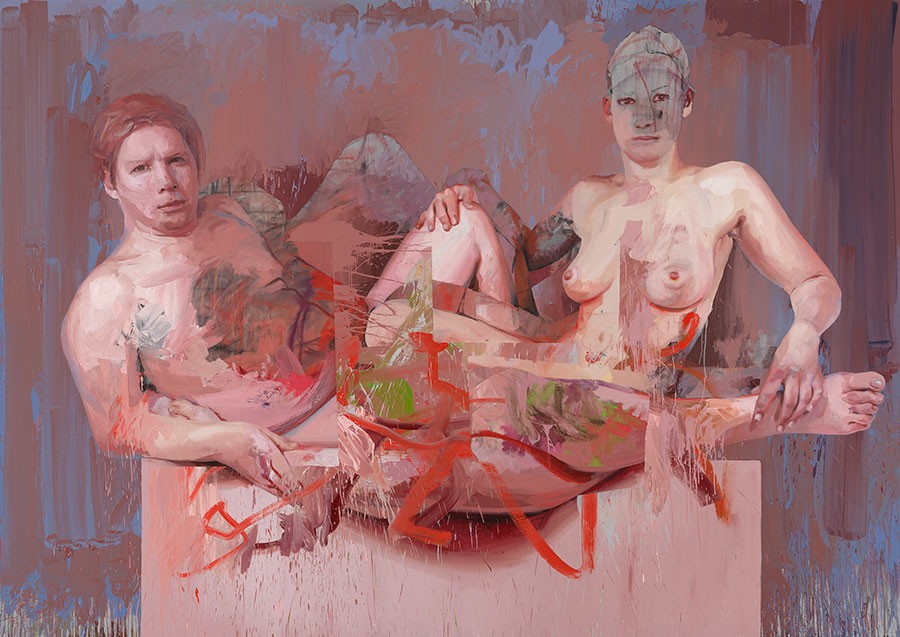Jenny Saville
Ancestors
03 May - 20 Jul 2018
JENNY SAVILLE
Ancestors
3 May – 20 July 20 2018
I’m trying to see if it’s possible to hold onto that moment of perception, or have several moments coexist... Like looking at a memory.
—Jenny Saville
Gagosian is pleased to present “Ancestors,” new paintings by Jenny Saville.
In her paintings and drawings, Saville transcends the boundaries of both classical figuration and modern abstraction in her depiction of the human form. Her work reveals a deep awareness, both intellectual and sensory, of how the body has been represented over time and across cultures—from fertility goddesses and antique and Hindu sculpture, to Renaissance drawing and painting, to the work of modern artists such as Henri Matisse, Willem de Kooning, and Pablo Picasso.
In this exhibition, Saville depicts the body from the perspective of classical sculpture. The immense canvases recall archetypes from religion and mythology, such as the pietà and the Fates.
Saville has always been fascinated by the visceral palpability of the human body. In 1994 she spent time observing a plastic surgeon at work, in order to study the construction of human flesh, in much the same way as Renaissance artists did, in their study of bodies and cadavers, to produce anatomical drawings and écorchés. In Saville’s new paintings, the marks and traces of painting and drawing merge with their sculptural subjects, as well as with the living, changing, and perishable forms that figurative art depicts. Each of Saville’s brushstrokes contains both the mass and musculature of the body, and the expression of line and gesture. Their physical and metaphysical layering evokes age-old questions pertaining to the representation of human flesh: narrow marks allude to the shape of forms, and broader marks to their internal surfaces.
The paintings in “Ancestors” envelop the viewer’s field of vision. The energy of the bodies, their raw human qualities, are often confronting in their improvised, non finito appearance, as if the forms—often of floating or indeterminate gender, and always subject to change—are emerging from an inchoate mass before our eyes. In painting the human body, Saville reflects the mutability of human behavior itself.
Jenny Saville was born in 1970 in Cambridge, England, and currently lives and works in Oxford, England. Collections include the Metropolitan Museum of Art, New York; The Broad, Los Angeles; Museum of Contemporary Art, San Diego; and Saatchi Collection, London. Recent institutional exhibitions include the 50th Biennale di Venezia (2003); Museo d’Arte Contemporanea, Rome (2005); Norton Museum of Art, FL (2011, traveled to Modern Art Oxford, England, through 2012); “Jenny Saville Drawing,” Ashmolean Museum of Art and Archaeology, University of Oxford, England (2015–16).
A major survey of works by Saville is on view at the Scottish National Gallery of Modern Art, Edinburgh, through September 16.
Ancestors
3 May – 20 July 20 2018
I’m trying to see if it’s possible to hold onto that moment of perception, or have several moments coexist... Like looking at a memory.
—Jenny Saville
Gagosian is pleased to present “Ancestors,” new paintings by Jenny Saville.
In her paintings and drawings, Saville transcends the boundaries of both classical figuration and modern abstraction in her depiction of the human form. Her work reveals a deep awareness, both intellectual and sensory, of how the body has been represented over time and across cultures—from fertility goddesses and antique and Hindu sculpture, to Renaissance drawing and painting, to the work of modern artists such as Henri Matisse, Willem de Kooning, and Pablo Picasso.
In this exhibition, Saville depicts the body from the perspective of classical sculpture. The immense canvases recall archetypes from religion and mythology, such as the pietà and the Fates.
Saville has always been fascinated by the visceral palpability of the human body. In 1994 she spent time observing a plastic surgeon at work, in order to study the construction of human flesh, in much the same way as Renaissance artists did, in their study of bodies and cadavers, to produce anatomical drawings and écorchés. In Saville’s new paintings, the marks and traces of painting and drawing merge with their sculptural subjects, as well as with the living, changing, and perishable forms that figurative art depicts. Each of Saville’s brushstrokes contains both the mass and musculature of the body, and the expression of line and gesture. Their physical and metaphysical layering evokes age-old questions pertaining to the representation of human flesh: narrow marks allude to the shape of forms, and broader marks to their internal surfaces.
The paintings in “Ancestors” envelop the viewer’s field of vision. The energy of the bodies, their raw human qualities, are often confronting in their improvised, non finito appearance, as if the forms—often of floating or indeterminate gender, and always subject to change—are emerging from an inchoate mass before our eyes. In painting the human body, Saville reflects the mutability of human behavior itself.
Jenny Saville was born in 1970 in Cambridge, England, and currently lives and works in Oxford, England. Collections include the Metropolitan Museum of Art, New York; The Broad, Los Angeles; Museum of Contemporary Art, San Diego; and Saatchi Collection, London. Recent institutional exhibitions include the 50th Biennale di Venezia (2003); Museo d’Arte Contemporanea, Rome (2005); Norton Museum of Art, FL (2011, traveled to Modern Art Oxford, England, through 2012); “Jenny Saville Drawing,” Ashmolean Museum of Art and Archaeology, University of Oxford, England (2015–16).
A major survey of works by Saville is on view at the Scottish National Gallery of Modern Art, Edinburgh, through September 16.

